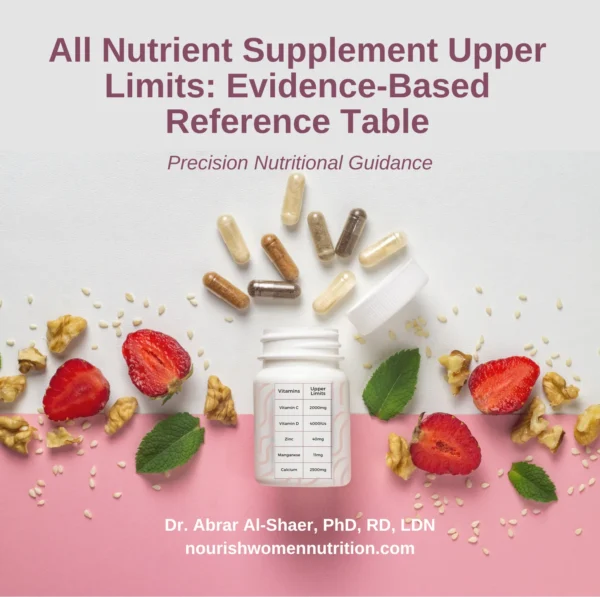

The “more is better” supplement trap is a prevalent misconception that often leads to unnecessary health risks. Many people believe that consuming more supplements will automatically yield superior results, but this isn’t always the case. In reality, exceeding safe upper limits can have detrimental consequences for your health. This article explores the dangers of this trap, delving into safe upper limits and personalized supplementation strategies for optimal results.
Understanding the Dangers of Excessive Supplement Consumption
The Allure of More
Many people feel pressured to take more supplements to achieve their fitness or wellness goals. This often comes from social media, influencers, and advertisements. The idea that more is always better can lead to excessive supplementation with unknown health consequences. There is an assumption that taking more of something good is always better, but with supplements, this is not always the case. In some cases, excess supplements can have adverse effects on the body, impacting organ function and overall well-being.
Potential Risks and Health Concerns
Excessive intake of certain supplements can lead to several health concerns. Liver damage, kidney problems, and digestive issues are some of the common side effects. Some supplements might interact negatively with prescribed medications, further complicating the situation and potentially leading to dangerous health complications. For example, high doses of vitamin A can be toxic, leading to serious side effects, while some supplements might worsen existing health conditions. It’s important to consult with a healthcare professional before making any significant changes to your supplement routine to identify potential risks.
Identifying Safe Upper Limits for Specific Supplements
Vitamin Supplements
Vitamin supplements are a popular choice, especially for athletes or those aiming for specific nutrient deficiencies. However, there are safe upper limits for vitamin consumption. For instance, excessive vitamin A intake might harm the liver. Likewise, excessive vitamin D can lead to kidney problems. Therefore, understanding individual needs and adhering to recommended dosages is vital to prevent adverse reactions and maximize absorption.
Personalized Supplementation Strategies
Assessing Individual Needs
It’s essential to recognize that each individual has different nutritional needs and physiological responses. Personal factors like age, gender, health conditions, and lifestyle all play a role in determining the appropriate supplement regimen. This individualization is key to finding the balance that helps you achieve your wellness goals effectively. Taking into account these factors allows for a customized approach, optimizing your well-being.
Examples of Common Supplement Issues
Iron Supplements and Anemia
Iron supplements can be helpful for those with iron deficiency anemia, but taking too much can lead to iron overload. This is a serious condition that can damage the heart, liver, and other organs. A doctor’s guidance is critical to preventing such issues. Similarly, excessive protein intake from supplements could strain the kidneys.
Consulting with Healthcare Professionals
Seeking Expert Advice
Before making any significant changes to your supplement routine, consult with a healthcare professional or a registered dietitian. They can assess your individual needs, recommend appropriate supplements, and provide guidance on safe dosages. It’s essential to listen to professional advice and make informed choices about your health.
Many individuals take excessive amounts of multivitamins, protein supplements, and vitamin D. These are often taken in hopes of boosting performance and overall health, but exceeding the recommended dosages can negatively affect the body. Be aware of potential risks associated with any supplement and always refer to healthcare professionals for proper advice.
“How can I prevent myself from falling into the ‘more is better’ trap when it comes to supplements?”
To avoid the pitfalls of the ‘more is better’ trap, it’s crucial to prioritize personalized supplementation strategies. This includes assessing your individual needs and working with a qualified professional to determine appropriate dosages and types of supplements. Instead of solely relying on advertisements and online information, it’s essential to seek professional guidance for optimized health outcomes. Always listen to what a healthcare professional recommends.
“What are the long-term health implications of taking too many supplements?”
Long-term overconsumption of supplements can have severe health repercussions. This can affect various organs, leading to long-term health issues. Organ damage, digestive issues, and interactions with medications are all significant risks. To avoid such detrimental outcomes, consulting a healthcare professional is paramount. This is the best way to ensure your well-being is not compromised.
“What are the most common supplements that people take in excess?”
In conclusion, the ‘more is better’ supplement trap highlights the importance of informed decision-making when it comes to nutritional supplements. Understanding safe upper limits and personalized needs is crucial for maximizing benefits and minimizing risks. Consult with a healthcare professional or registered dietitian before starting any new supplement regimen. Their expertise can help determine the optimal dosage and ensure it aligns with your individual health goals and any underlying conditions. This will help you steer clear of the supplement trap, ensuring you achieve your wellness objectives safely and effectively.